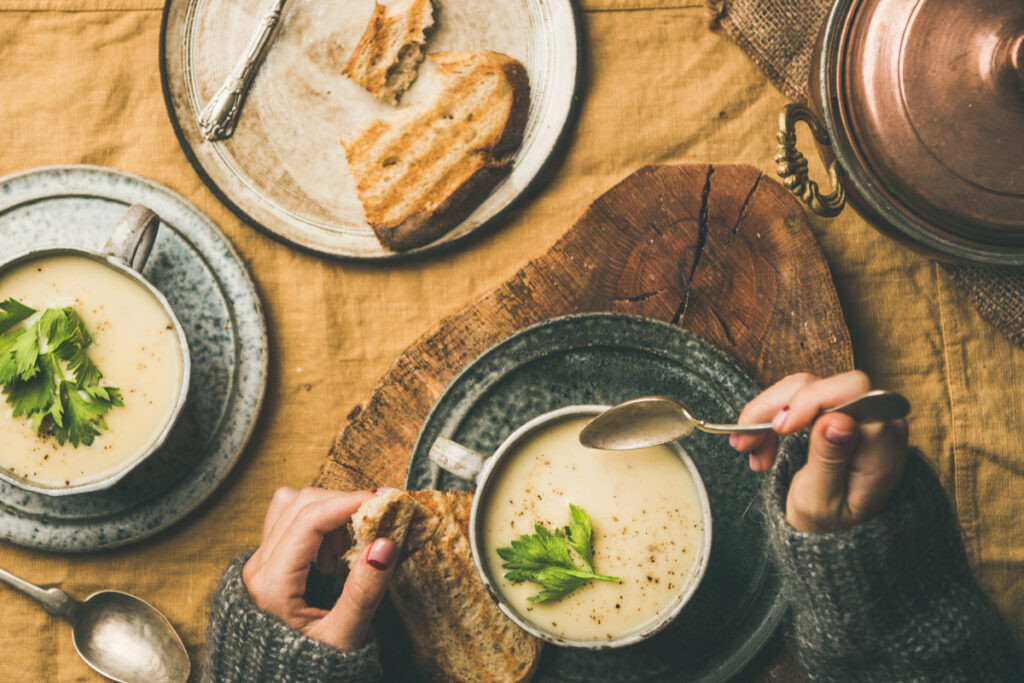As winter rolls in, many of us start to wonder, “How can I avoid winter weight gain?” It’s completely normal to worry about seasonal weight gain as the weather turns colder. With over 20 years as a Registered Dietitian Licensed Nutritionist, I’ve seen firsthand that winter doesn’t have to mean putting on pounds.
The good news is that winter weight gain isn’t a given. In fact, contrary to popular belief, seasonal weight gain varies greatly among individuals.
In this article, I’ll share my 7 favorite strategies to avoid winter weight gain, focusing on how we can all stay healthy and happy during these colder months, with an emphasis on overall well-being rather than just restrictions or the scale.

Is it Normal to Gain Weight During the Winter?
In my two decades as a dietitian, I’ve often encountered the misconception that winter is synonymous with putting on extra pounds. For most of us there seems to be an unhidden rule that just as bears hibernate or trees lose their leaves we are bound to gain weight in the winter. This can lead to feelings of stress and depression.
While it’s true that colder weather can lead to cravings for more energy-rich foods, this doesn’t inherently lead to weight gain.
Everyone reacts differently to the change in seasons. For some, winter might bring a desire for heartier meals, while for others, there’s little change in appetite or food preferences.
The key is understanding your own body’s signals and responding in a way that nourishes you and finding joy in winter foods and activities. Remember, our bodies are complex, and their needs can vary greatly. It’s this individual variance that guides my approach to nutrition and wellness during the colder months.

Understanding Our Bodies and Weight Gain in the Winter Season
Our bodies react to cold weather in unique ways, influencing our eating habits and the food we crave. There’s a common belief that our bodies burn significantly more calories in the cold as they work to maintain a stable internal temperature.
While we do use a lot of energy to keep our bodies warm during the summer, we use more energy to keep our bodies cool during the warmer seasons.
As the temperature drops in winter, our bodies undergo biological changes that can influence our eating habits.
“Colder weather can create biological changes that make us want to eat more. When the temperature drops, it’s natural that we would crave foods that provide us warmth. Oftentimes, the foods we choose in the winter months are higher in sugar and fats than we would otherwise consume.”
This natural inclination towards richer foods can contribute to winter weight gain. Let’s explore four key factors that might contribute to this seasonal weight change:
Cold Weather
While there’s a belief that we burn more calories in the cold, it may not be significant. Weather alone doesn’t cause unwanted weight gain or weight loss.

Holiday Meals
The holidays often bring an abundance of rich, calorie-dense foods which can be a significant contributor to annual weight gain. It’s usually not the cold weather that’s adding the pounds, but the extra helpings and festive treats.
Sleep Pattern Changes
Shorter days and longer nights can disrupt our sleep patterns which can affect our metabolism and appetite. Keeping to a regular sleep schedule is important when we’re trying to maintain a balance in our bodies.
Seasonal Affective Disorder (SAD)
Psychologically, winter can have a profound effect on our eating habits. Shorter days and less sunlight can lead to changes in mood and energy levels (Seasonal Affective Disorder), influencing our food choices. Many people find comfort in richer, high-calorie foods during the colder months.
Symptoms of Seasonal Affective Disorder Can Include:
- Persistent low mood
- Loss of pleasure or interest in normal everyday activities
- Irritability
- Feelings of despair, guilt, and worthlessness
- Lethargy (lacking in energy) and sleepiness during the day
- Sleeping for longer than normal and finding it hard to get up in the morning
- Craving carbohydrates and possible weight gain
It’s important to note that these four factors – cold weather, holiday meals, changes in our sleep patterns, and seasonal affective disorder – don’t affect everyone in the same way.
Some people may be affected by one factor more than the others, or experience a combination of several of them.
What does this mean for you? Studies have found that when considering average weight gain over a year, holiday weight is the major contributor to annual excess weight gain. While holiday weight gain contributes significantly to annual excess weight, it’s important to approach this issue with a focus on long-term, sustainable lifestyle changes rather than short-term fixes.
Now that we’ve talked about how our bodies and eating habits can be affected by winter, let’s shift our focus to proactive strategies.
These strategies are not just about avoiding weight gain but also about enhancing our overall health during the colder months. From nourishing whole foods to mindful eating practices, these tips are designed to empower you in making choices that align with your body’s needs and well-being.
Let’s start with the first and one of the most delicious strategies: embracing whole foods!
My 7 Favorite Strategies to Avoid Winter Weight Gain

Strategy #1: Embrace Whole Foods for Nourishment
Incorporate a variety of whole foods into your diet to maintain health and balance during winter. Whole foods, such as fresh fruits, vegetables, whole grains, lean proteins, and healthy fats, are packed with essential nutrients. They help in keeping you full and satisfied, reducing the likelihood of overeating.
Embracing whole foods also means you’re getting a wide range of vitamins and minerals, which are crucial for supporting your immune system and overall health during the colder months.
Examples of whole foods include:
- Fresh fruits like apples, oranges, and berries
- Vegetables such as kale, carrots, and broccoli
- Whole grains like quinoa, brown rice, and oats
- Lean proteins, including chicken, fish, and legumes
- Healthy fats from avocados, nuts, and olive oil

Strategy #2: Stay Active with Enjoyable Exercise
Regular physical activity is essential, especially during the winter months. Finding enjoyable ways to stay active indoors can make a big difference. Here are some fun indoor activities to try:
- Virtual Dance Classes: Join an online dance class for fun and fitness.
- Yoga or Pilates: Practice yoga or Pilates in person at a studio or using online tutorials or apps.
- Bodyweight Exercises: Engage in exercises like push-ups, squats, and lunges.
- Stair Climbing: Use stairs for a cardio and leg workout.
- Playing with Kids or Pets: Turn playtime into a fun workout.
- Online Fitness Challenges: Participate in online fitness challenges or communities.
- Stretching or Foam Rolling: Incorporate stretching or foam rolling for flexibility.
These indoor activities are excellent for keeping winter weight gain at bay. But remember, there’s more to explore outside your home:
- Ballroom Dancing Classes: Dance for social interaction and physical activity.
- Indoor Rock Climbing: Challenge your mind and body in a fun setting.
- Golf Simulators: Enjoy golf indoors with technology.
- Community Theater Groups: Get active in local theater productions.
- Social Clubs with Physical Activities: Join clubs that incorporate physical activities.
- Martial Arts or Self-defense Classes: Stay active while learning new skills.
- Indoor Swimming at Community Pools: Enjoy low-impact swimming exercises.
- Bowling Leagues: Engage in bowling for fun and light activity.
While these activities are great for staying active, it’s important to note that not all activities provide the same level of physical exertion. To truly benefit from exercise, aim for activities that increase your heart rate. If you’re looking to push your physical fitness further, consider trying some of the more intensive options outlined above. Additionally, incorporating a variety of activities like these can help maintain consistency and longevity in your exercise routine, keeping your body moving and adapting to different challenges over time.

Strategy #3: Cultivate Calm to Counteract Stress
Managing stress is important, especially during winter, as it can significantly impact your body and overall health. When we’re stressed, our bodies release stress hormones like cortisol, which can affect our metabolism and appetite. Elevated cortisol levels can lead to cravings for high-fat, high-sugar foods, and may also cause the body to store fat more readily, particularly around the abdomen.
Additionally, chronic stress can disrupt sleep and exercise routines. By finding effective ways to manage stress, such as through meditation, deep breathing exercises, or engaging in hobbies that relax you, you can help maintain a healthier balance in your body. This not only aids in weight management but also contributes to overall well-being.
Strategy #4: Streamline Your Diet with Strategic Meal Planning
Meal planning and preparation are powerful tools in managing your diet, especially during winter. By planning and prepping your meals, you take charge of what you eat, ensuring a balance of nutrients and avoiding impulsive decisions. This approach helps you steer clear of high-calorie, nutrient-poor foods, and instead, helps you focus on meals that are both satisfying and nourishing.

Meal prep allows you to have healthy options readily available, reducing the temptation to opt for convenience foods that may lead to weight gain. By preparing meals in advance, you’re more likely to stick to portion sizes that align with your dietary goals. This habit not only supports weight management but also saves time and reduces stress around daily meal decisions.
The key to successful meal planning is variety and balance.
Incorporating a mix of proteins, healthy fats, and a range of fruits and vegetables ensures that your meals are both nutritious and enjoyable. This strategy is not just about managing your winter weight; it’s about creating a sustainable, healthy eating pattern that can last a lifetime.
Strategy #5: Foster a Supportive Network
Having a support system is a proven strategy for successful weight management. Studies show that people who have a network of support tend to achieve and maintain their health goals more effectively. Here are some advantages of having a support system:
- Motivation: Surrounding yourself with supportive people can provide a motivational boost, especially on days when your own motivation might be lacking.
- Accountability: A support system holds you accountable to your goals. Knowing that others are aware of your objectives can encourage you to stay on track.
- Emotional Support: The journey to better health can have its ups and downs. Having someone to share your struggles and successes with can provide emotional comfort and resilience.
- Diverse Perspectives: Interacting with others allows you to gain different viewpoints and strategies that might work for you.
- Learning from Experiences: Sharing and listening to others’ experiences can be enlightening. You can learn what worked (or didn’t work) for others, understanding that while everyone’s journey is unique, there are common lessons to be learned.

Creating a support system can involve joining a fitness group, participating in online forums, or simply having a friend or family member to share your journey with. Remember, the path to wellness is often more successful and enjoyable when shared.
Strategy #6: Sharpen Your Focus for Enhanced Mindful Eating

Journaling for Awareness: Keeping a food journal goes beyond just tracking what you eat. It involves noting down your emotions, hunger levels, and even the circumstances surrounding your meals. This practice can reveal patterns in your eating habits, helping you become more conscious of why you eat, not just what you eat. Over time, this awareness can lead to better food choices and portion control.
Meditation for Clarity: Regular meditation can be a powerful tool. Even a few minutes of meditation daily can help clear your mind, reduce stress, and improve your ability to focus on your health goals. This mental clarity can make you more mindful during meals, allowing you to savor each bite and recognize when you’re full.
Setting Clear, Achievable Goals: Having well-defined, realistic goals gives you a clear target to focus on. Whether it’s incorporating more vegetables into your diet, reducing sugar intake, or cooking at home more often, specific goals keep you aligned and motivated.
Practicing Mindful Eating: This means paying full attention to the experience of eating and drinking. Focus on the taste, texture, and aroma of your food. Eat slowly and without distraction. This practice not only enhances the enjoyment of your meals but also helps prevent overeating by allowing your body to recognize when it’s satisfied.
For a more in-depth look at mindful eating, check out this blog post with a complimentary, downloadable Mindful Eating Journal.
By integrating these practices into your daily routine, you can strengthen your focus, leading to a more mindful, health-conscious approach to eating.
Strategy #7: Strategize Your Wellness Routine
The final key to successfully managing your health and wellness is to strategically plan your routine. This involves more than just deciding what to eat or when to exercise; it’s about creating a comprehensive plan that encompasses all aspects of your health journey, including stress management and relaxation.
- Meal Planning: Decide your meals in advance for healthier choices and stress reduction.
- Scheduled Grocery Shopping: Regularly stock up on whole foods to avoid impulsive eating.
- Fixed Exercise Time: Incorporate a set exercise schedule to maintain physical health.
- Allocated Relaxation: Ensure regular periods for stress management and relaxation.
- Structured Routine: Create a balanced lifestyle rhythm by organizing these key activities.
By strategically planning aspects like meal preparation, grocery shopping, exercise, and relaxation, you set the stage for a balanced and healthy lifestyle. Each of these elements plays a vital role in creating a harmonious rhythm in your daily life, ensuring that you’re not just surviving, but thriving.

A Personalized Approach to Winter Health and Wellness Goals
Switching gears from movement, Switching gears, I want to talk about something equally important when it comes to weight gain this holiday season – personalized health and wellness goals for the winter. Everyone’s different, right? Just like we all have our favorite winter coat, our bodies need an overall wellness plan that fits just as well to help prevent weight gain.
In my work, I love creating smart goals that match each person’s unique needs during these chilly months. Whether it’s finding tasty ways to add winter veggies into your meals, adjusting your food choices if you’re less active, or even dealing with those winter blues, a plan just for you can make a big difference. It’s all about feeling great and enjoying winter, your way.
In Summary
As we wrap up, let’s revisit what we’ve talked about. Winter doesn’t have to mean weight gain. It’s about balance – listening to our bodies, enjoying nourishing whole foods, reducing stress levels and staying active, even if it’s just dancing in your living room.
Remember, no one-size-fits-all here; it’s about what works for you. Let’s ditch the stress of dieting and scales. Embrace the season with a mindset of joy and health.
Winter is a time to focus on our overall health, not just body weight. Eat mindfully, move joyfully, and nourish yourself in a way that feels right.
If you’re looking for a helping hand to navigate your nutrition this winter, I’m here for you. Whether it’s crafting a personalized nutrition plan, exploring mindful eating, or finding the best ways to help reduce stress levels, I’ve got you.
Head over to my contact page to see how we can make this winter your healthiest and happiest yet. Remember, it’s all about a journey tailored just for you. Let’s get started!






